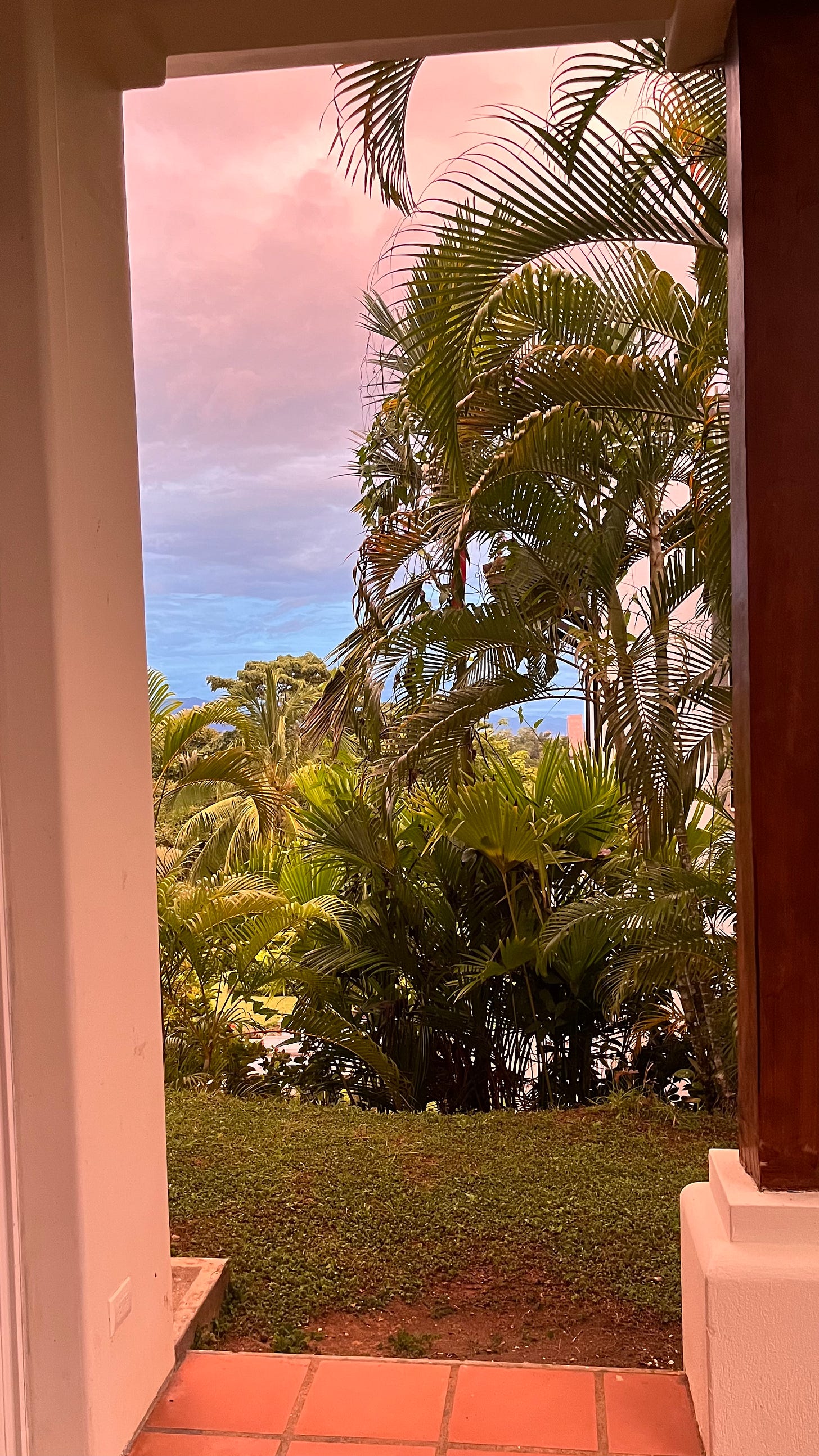November 1 - the Monthly Mash-up Post for all Readers
Contemplative/nature writing (and a poll), and answering a question of 'clues to offer your reader'
Costa Rica sky & glow
~~~
For new Unschool reader-writers, you can click on the title to read this post directly on site. These first-of-the-month posts are snippets of what The Unschool is about: a craft offering, a prompt, a re-cap of the month, and more. At times a market to send work to, or notice of a workshop offering, sometimes a poll (which often forms the basis of a post.) A Q&A with a writer. Check out the Indexes on the home page to read other such monthly offerings. And always, let me know of any writing and publishing related questions: alison@alisonacheson.com.
~~~
In the Canadian Thanksgiving post of Oct. 14, I shared some of Thomas Merton’s nature writing from a wonderful little volume titled, when the trees say nothing, and my intention to do some of this contemplative work myself while in Costa Rica.
I’ve set aside a bit of time each day for this. It feels easier to do this in a new place. But after the weeks of doing it here, I’m going to transfer the process back home. Being elsewhere can be time to begin a new habit.
A sample of snippets:
Oct. 19
Oh a yellow bird, with a flight of changing direction constantly—what’s a word for that? feels as if it should be new—just flew under the patio roof, in and out again, so quickly. Changing mind?
It this why we travel? For new vocabulary to describe the unfamiliar? Make the familiar unfamiliar?
Oct. 20
How fitting that the real afternoon rain should come on Sunday. It’s half past three—exactly—and it’s been threatening thunder for some time. And it’s pouring as I sit on the patio, the rain rattling so on the tinny-sounding roof. In minutes, as I write, it’s dripping off the edges. Sky both cloudy and bright, as if it doesn’t know quite what to do, but can’t contain itself. A bubbly adolescent girl at a party.
Oh, she’s reining herself in now, growing older by the minute, and darkening, shadowing. Tired of letting me off, she gusts right into the middle of the patio and reaches me and my papers. Ruffles them, lets me know she might set them off at any minute.
All right, you. I’ll get up and move them. As she settles in for some real time of weeping—had too much to drink after all. It’s hard to be young.
Oct. 21
The earth felt leaden with moisture when I first came outside. You can feel the heat, stepping outside. Now that’s subsiding. But a sense of rest after the tumultuous thunder and lightning of last night. Seeing palm trees back lit with lightning is good black on blue.
On the stony roadway there are insect byways. I stoop over to watch them, so busy, two streams of bugs, one flowing in one direction, and the other moving opposite with each carrying a piece of green leaf, like a sail. Flags in a parade. So proud.
~~~
And the Prompt is:
Stay exactly where you are. Or go somewhere you’ve not been before, and settle into the place, the natural space of it. Grow quiet. Listen. Smell. Look. No, don’t taste the poisonous fall mushrooms! But fill your senses.
You may not practice any form of meditation or contemplation, or perhaps writing is your form of being still. You may be new to this—to setting aside such time. This is about writing for joy and connection; connection to the natural world and the self in it, too.
Please post a piece or two in the comments, and use a heading of “Prompt” so we know you’re sharing a response.
(I expect it’ll be obvious! But it’ll distinguish the responses from the usual comments.)
Poll
For the purposes of the poll, your “writing practice” doesn’t have to be focused on the natural world. You don’t need to explain—it might be some form of personal journal, writing about your spiritual life, life with your dog, your daily cooking—whatever, for you, is contemplative, a time when you slow or find yourself thoughtful, and write about it. Or within that space.
If you’d like to share thoughts about this, please do. This feels like a very different type of writing in the world. Different pace, different reasons for existence and persistence.
Might be subsistence. A foundational place, overlooked.
Reconsidering “Holes” for Your Reader
In my post of October 22, I write about leaving holes in your work for your reader to enter into.
In the comment area, Joshua Doležal (of The Recovering Academic) left a note with a question worthy of pondering:
Josh: This is lovely discourse, especially about when to draw the curtain on certain moments. Ben Percy writes similarly about taking violence offstage, the way O'Connor does in "A Good Man Is Hard to Find." Rather macabre, but the gunshots are more powerful back in the forest, out of sight, as the family is led away. So, too, with some intimate moments.
I wonder if you agree that the trick in those cases is to provide just enough for the reader to complete the scene in their own imagination?
Me, after thinking: My first impulse was to say ‘yes.’ Perhaps because I felt that in the scene in question (a scene of death) there was “enough.” About halfway through the book, a nurse describes the most frequent realities of death with ALS, so yes, a reader can bring that knowledge to the scene and surmise whatever else they might want to, along with a message of privacy.
There’s always “however…”
Some readers may feel there hasn’t been enough. After all—also in the post—my agent’s thoughts on this: she didn’t feel there was enough.
I thought about how, if writers leave deliberate gaps in memoir/nonfiction for purposes of privacy, what is it to leave words elsewhere to point the reader in a particular direction?
The post was focused on how creating “holes” or spaces in work, invites IN the reader. But I included thoughts on how, at times, leaving material out does invite them in, albeit in different ways.
But Josh’s question make me think—as often readers’ question do— how there are always other sides. Always.
Spirit of the thing
I speak to some of the mechanics of the writing process that are intended to accomplish the inclusion of the reader—the conscious decisions on the part of the writer, as well as the varying levels of the unconscious in the process, some of which come not from writing, but from the spirit of the writer, the intent, and the work itself.
The flip-side is that our human capacity for understanding and empathy, and reading also comes from who we are and the “spirit of the thing.”
Leave the reader with enough pieces and they’ll do the work or create their own from whatever breadcrumbs we leave, and the fruition of their imagination.
Breadcrumbs
As writers we might lay out “clues” for the reader (Josh’s word “trick” is implicit here—though I’m not suggesting he means trickery. I’ve read his recent poetry collection and there is no trickery; it’s rich with where language can take us).
But such clues might be uncovered and interpreted or strung together in ways we can’t imagine. An observant and mature reader might become irritated if these pieces are overtly asking to be puzzled through, and pointing. So to place and weave through becomes a significant part of the creating. And other readers might not be able to put pieces together for one reason or another.
Some writers leave multiple layers for the reader to pick up and weave on their own. They might even go off-script—
(What might make that happen? And what then? Are you okay with that? What comes to my mind are the possibilities of some of the threads of earlier drafts of work, threads that later don’t “connect” in the ways we’re used to thinking about connecting. Threads that might give the reader deeper nuances of a character, for instance; here, I feel as if I’ve moved on from memoir to fiction, in which there’s more forgiveness for such. Though, ironically, such writing might serve nonfiction and biography. Imagine: the biography of a long life might be filled with such extra pieces. So many humans, if we were to truly puzzle them together, might be found to have such extra bits at the end of the day. Memoir however, is shaped and developed with more intentionality than this.)
What do we want the reader to know? How important is this, and why? Is there something we hope they don’t miss? Will we be left feeling we’ve “cheated” them in some way… Of what? An experience? A realization? A “pay off”—to use a word that can be thrown about, usually alongside “stakes.” Is the reader on the inside, or the outside? Does our exclusion have a purpose?
End of first draft
More than anything, this might be a question to check in with at the culmination of your first draft. Ask: to what degree you’ve provided “enough” for the reader? Should there be more? The holes you’re leaving, do they give the reader room to be and move in the text? (Leaving holes isn’t not about being coy. Coyness is trickery!)
The point to the original post was to leave holes for the reader to fill, for the reader to find their own space within the work—to not feel left behind, left out. If you’re trying to give the pieces/images to fill, then what happens to the thought to leave those gaps in the first place?
Yet, thinking of the question here: if the reader feels there’s something left out of the whole, something they can’t grasp and want to, will this really remove them from the work?
Options
There’s the role of leaving holes, yes, but also the nature of holes. The nature might be to push away. Or it might be to push—however gently—a reader’s imagination in a particular direction.
Less and less we have capable imaginations; our culturally intense draw to think that we can be rational and logical about the layers of our world is killing this capacity in us.
What is the role of our threshold for mystery? To have mystery in our lives, our stories, and to accept it in others, and their stories. Mystery is the stuff of reflection, pondering. Mystery slows us, stills us. In the spirit of mystery we might try to piece together, puzzle through. Or we might accept.
Each of us has a differently levelled threshold.
And in the end — or one end…
I had to think about the breadcrumb quality of stories—what the writer sets out, when and where. And also about the reader, looking for those crumbs, feeling a need. Or not.
And the ineffable piece of what we do, too. Not that we are off the hook for trying to articulate. Or place those crumbs. Or leave the path unmarked. Or just give someone a piece of toast with jam as they wander the woods.
Each according to its needs. And I’m back to that phrase that has haunted me since my days studying with Sue Ann Alderson, when she’d look at us around a table, and ask the question:
What serves the story?
~~~
Many thanks for the mull, Josh! “Answers” are surely the tricky part! Mostly I feel I’ve teased out the possibilties.
Other posts you might have missed this month:
The October 1 “mash-up” with its thoughts on celebrating the ordinary, and a call for workshops — novel-writing and I’ll add “picturebook” to this call, too. PLEASE email me if interested in posting work to these (paid folks only): alison@alisonacheosn.com
And the first week post was about first drafts and second chapters:
Early this week, I posted a collection of favourite posts from the archives, along with links to each of the annual indexes, and a Thank you to those who have recently decided to actively support The Unschool — thank you!
~~~
Gift-giving
That gift season thing is coming—soon. And in the spirit of not adding to people’s STUFF, you might consider gifting subscriptions to Substack newsletters. The Unschool… obviously! But there are many others, and in the next few weeks, I’ll share some of my faves.
I’m more than a little miserable about the “sell” thing these days. So am only sharing those I would expect you to be wildly excited about—always, of course, for the Right Person.
And I’ll do this as its own separate piece, not here. That way, if you’re not interested, you can move on to the next email. Keep an eye out —
Two days ago, here in Costa Rica, I was in a household goods store, and the employees were filling TABLE full of Christmas decorations, and red and green afghans and red plastic poinsettias, and shelves of nativity scene figures, and the PA system all seasonal tunes I mentioned it to the woman who was driving us, saying Feliz Navidad is very early here—and she was clearly happy about it and animated.
No Scroogey-ness here!
As a kid pedalling a bike goes by with a surf board under his arm…








I'm glad you are enjoying your time in Costa Rica and thinking about writing. I often find a change of scene gets my creative juices going. That's why I travel with a notebook.